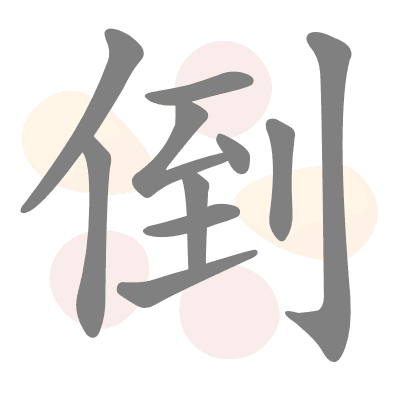倒
倒
v. to fall over, to fail or collapse; to overthrow; be spoiled, have malfunction; change, shift; move around; sell up; buy and resell at a profit
| 80% | 120% |
Register to get less ads.
Registration is free and once you are registered you use this word in your private vocabulary lists.
Then you can train your own vocabulary either here or using one of our applications for PC, iOS or Android.
Registration is free and once you are registered you use this word in your private vocabulary lists.
Then you can train your own vocabulary either here or using one of our applications for PC, iOS or Android.
Other meanings
| v. to pour, to tip; to invert; to reverse; to move backward |
|
| adj. upside down, inverted |
|
| adv. (contrary to common sense or one's expectation); but, however; (after a "verb + de" structure, implying blame); (in the subordinate clause, indicating concession); (in an imperative sentence or a question, indicating impatience); (used to soften the tone) |
|
 |
Simplified stroke orders are based on the 'Standard of National Commonly-used Mandarin Chinese Characters (现代汉语通用字笔顺规范)', issued by the China National Language and Character Working Committee (国家语言文字工作委员会) on April 7th 1997. Traditional stroke orders are based on information issued by the Taiwan Ministry of Education.
他 他 phr. He earned money by buying and selling clothes. |
倒 倒 v. go bankrupt, close down |
倒 倒 v. resell tickets |
倒 倒 v. to fall or collapse from power |
倒 倒 v. spoil one's appetite, lose one's appetite, get fed up with, be disgusting |
跌 跌 v. fall down |
他 他 phr. He fell sick due to overwork. |
推 推 v. push over, overthrow |
倒 倒 v. resell at a profit, speculate |
倒 倒 phr. fall down |
倒 倒 v. to change trains or buses; to buy and sell cars (for quick profit) |
倒 倒 v. bring down a cabinet, force a government to resign |




